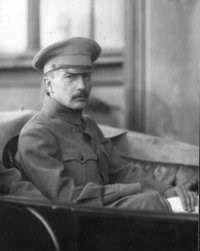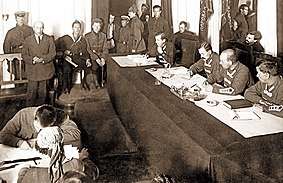Boris Savinkov
Boris Viktorovich Savinkov (Russian: Бори́с Ви́кторович Са́винков; 19 January 1879 – 7 May 1925) was a Russian writer and revolutionary. As one of the leaders of the Fighting Organisation of the Socialist Revolutionary Party, he was responsible for the assassinations of several high-ranking imperial officials in 1904 and 1905.
Boris Savinkov | |
|---|---|
 Savinkov, as Asst. War Minister in 1917 | |
| Born | Boris Viktorovich Savinkov 19 January 1879 |
| Died | 7 May 1925 (aged 46) |
| Cause of death | Defenestration (murder or suicide) |
| Education | St. Petersburg University, Heidelberg University |
| Occupation | Assistant War Minister in Provisional Government |
| Organization | Fighting Organisation |
Notable work | Memoirs of a Terrorist, The Pale Horse |
| Political party | Socialist Revolutionary Party |
After the February Revolution of 1917, he became Assistant War Minister in the Provisional Government. After the October Revolution of the same year, he organized armed resistance against the ruling Bolsheviks. Savinkov emigrated in 1920, but in 1924 he was lured back to the Soviet Union, was arrested and either was killed in prison or committed suicide.
Young years
Savinkov was born in Kharkov (Kharkiv), the son of a judge in Warsaw. In 1897 he entered the law department of St. Petersburg University but was expelled in 1899 because of participation in students' riots. Later he studied in Berlin and Heidelberg. From 1898 he was a member of various socialist organizations. In 1901 he was arrested and sent to exile to Vologda. He served the exile with some prominent Russian intellectuals including Nikolai Berdyaev and Anatoly Lunacharsky. However he became disappointed with Marxism and shifted to terrorism. In 1903 Savinkov escaped abroad and joined the Socialist Revolutionary Party, where he soon became Deputy Head of its Combat Organization under Yevno Azef.
Socialist Revolutionary Party
In 1906, he was arrested and sentenced to death for his assassination of Vyacheslav von Plehve, the Russian Minister of Interior, and participation in the assassination of Grand Duke Sergei Alexandrovich of Russia. However, he escaped from his prison cell in Odessa and exiled himself to avoid recapture. When Azef was revealed as an agent of the Okhrana in 1908, Savinkov was appointed leader of the Fighting Organization, but by now was not strong enough to conduct any serious operations. While in France Savinkov volunteered in the French Army during World War I. In April 1917, several months after the February Revolution, he returned to Russia, and in July became Deputy War Minister under Alexander Kerensky. On 30 August, however, he resigned his post and was expelled from the Socialist Revolutionary Party due to his role in the coup of General Lavr Kornilov.
Civil war
Savinkov remained in Russia after the October revolution and organised a new counter-revolutionary organisation called the Society for the Defence of the Motherland and Freedom, whose headquarters were at 4 Molochny Alley in Moscow, where his deputy Dr. Grigoriev maintained a medical establishment as a façade.
Savinkov, a leader of the Society for Defence of Motherland and Freedom, managed organisation of several armed uprisings against the Bolsheviks, the most notable being in Yaroslavl, Rybinsk, and Murom in July 1918. Savinkov returned to France after these uprisings were crushed by the Red Army. There, he held various posts in the Russian emigre societies and was Admiral Aleksandr Kolchak's main representative in Paris. During the Polish-Bolshevik War of 1919–1920, he moved to Poland, where he formed a Russian political organisation responsible for the formation of several infantry and cavalry units out of former Red Army POWs. Together with Merezhkovsky, he published in Warsaw a newspaper entitled «За свободу!» ('For Freedom!). Once the Polish-Bolshevik War concluded in October 1921, Polish authorities sent Savinkov out of the country in order not to cause further friction with the Soviets.
Trust Operation and death

He was an acquaintance of Sidney Reilly, the legendary renegade British agent, and was involved in a number of counter-revolutionary plots against the Bolsheviks, sometimes collaborating with the British Secret Intelligence Service (SIS). These efforts were effectively undermined by the Trust Operation implemented by the Soviet security agency OGPU. Savinkov was lured into the USSR to meet with false conspirators and consequently arrested. The USSR Supreme Court sentenced him to death but the Presidium of VTsIK converted the sentence to 10 years imprisonment. During his trial, Savinkov declared that he recognized the Bolsheviks and assumed his defeat. While imprisoned, he wrote satirical stories about white émigrés and was allowed to see them published in Moscow. According to the NKVD, he committed suicide by jumping from a window in the Lubyanka prison, in Moscow. However, according to modern publications by Aleksandr Solzhenitsyn and others, Savinkov was killed in prison by OGPU officers. Semyon Ignatyev wrote at the time of the Doctors' Plot that Stalin complained that the MGB was too humane in its interrogation of prisoners exclaiming, "Do you want to be more humanistic than Lenin, who ordered Dzerzhinsky to throw Savinkov out a window?"[1] (Lenin had been already dead for several months by the time Savinkov returned to Russia.)
Legacy
Boris Savinkov wrote several books. His most famous are an autobiography, Memoirs of a Terrorist, and a loosely autobiographical novel called The Pale Horse. Savinkov's works raised huge controversy among SRs. Many of them disclaimed them as "spoofs" on terrorism.
In popular culture
Films
- Karen Shakhnazarov directed a 2004 film entitled The Rider Named Death based on Savinkov's autobiographical fiction, The Pale Horse.
Television
- Savinkov was played by Clive Merrison in the 1983 BBC miniseries Reilly: Ace of Spies.
Works
- The Pale Horse (novel), 1909 (English edition 1919, online), Russian: Конь бледный (Konʹ blednyj) - published under the pseudonym "V. Ropshin"
- What Never Happened: A Novel of The Revolution, 1912 (English edition 1917, online), Russian: То, чего не было (To, chego ne bylo) - published under the pseudonym "V. Ropshin"
- Memoirs of a Terrorist, 1917 (English edition 1931), Russian: Воспоминания террориста (Vospominanija terrorista)
- The Black Horse (novel), 1924 (Russian edition 1923), Russian: Конь вороной (Konʹ voronoj)
- "Boris Savinkov's Letter to Felix Dzerzhinsky", in The Russian Review, Vol. 29, No. 3 (July 1970), pp. 325–327
Further reading
- Spence, Richard B. Boris Savinkov: Renegade on the Left, Columbia University Press, 1991.
- Wędziagolski, Karol. Boris Savinkov: Portrait of a Terrorist, Kingston Press, 1988.
See also
- SR Combat Organization
- Yevno Azef
- Sidney Reilly
References
External links
- Archive of Boris Viktorovič Savinkov Papers at the International Institute of Social History
- Visions of Terror: Boris Viktorovich Savinkov (1879-1925)

- Newspaper clippings about Boris Savinkov in the 20th Century Press Archives of the ZBW